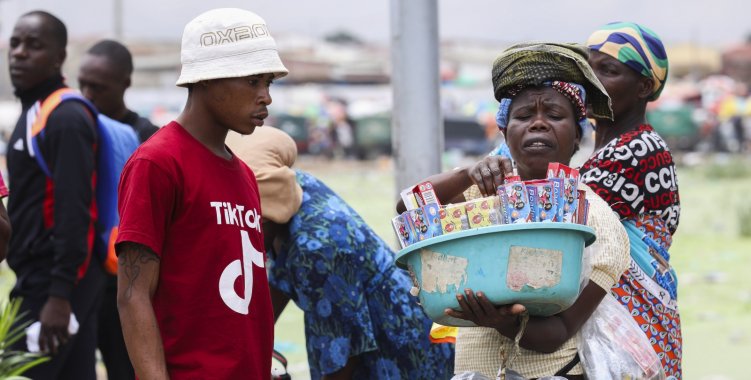The devaluation of the kwanza also influenced the increase in prices in warehouses, the main source of supply for small traders, who in the markets, on the streets, resell products and use the profits to satisfy their basic needs.
With the festive season just around the corner, the increase in prices is expected to increase, despite the authorities guaranteeing that measures are being implemented to avoid speculation.
The population's weak purchasing power was another factor causing a drop in business, as explained by Eva Agostinho, a zungueira (street vendor) for 20 years and mother of seven children.
"Business is tough, it's difficult, it doesn't show up, it's very expensive," she told Lusa, adding that she still has to deal with the problem of inspectors, who receive the products or ask for money.
Dedicated to selling pieces of fishing nets, which are used for bathing, her business comes from the province of Benguela, but the price "has increased a lot since the President [of the Republic] came into power", complained Eva Augustine.
Joana Bezerra, a zungueira for 24 years, also sells clothes made with African cloth, but considers that this business was worth it in the past, because prices have increased and she barely makes a profit anymore.
"There are times when we buy for 1000 kwanzas and sell for 1500, to earn 500 kwanzas and that is what we are supporting our lives with," she said.
Joana Bezerra, with her own house, has help from her husband, who works at Coca-Cola, unlike Celestina Codina, 51 years old, widow and mother of five, who arrived in Luanda, capital of Angola, in 2014, coming from the province from Uíge, and a year later she became a zungueira.
Celestina Codina sells brooms, but regrets that the price of the product has risen and "she earns almost nothing".
"With the little bit we earn, we can buy a kilo of cornmeal (flour) and be able to raise our children", she highlighted, adding that she already has some help from her eldest daughter, who is also a plastic bag hopper.
According to Celestina Codina, she manages to sell between two and three brooms every day, and earns 350 kwanzas on each broom.
Among the hundreds of street vendors in the inn area, in the municipality of Viana, was also António Givunge, 58 years old, who has been on the streets for almost 38 years selling Portuguese, English and French language teaching books.
António Givunge, a native of the province of Malanje, said that "the [cost of] business has gone up", but he is "making amends for his life", selling four to five books daily, with a gain of 3000 kwanzas.
"This money is what is sustaining us, the important thing is to have the strength to work", said the zungueiro, who supports one of the three daughters he had – two have already died – and three more grandchildren.
Despite the weak business, António Givunge said that he will continue to sell books between the city center and the municipality of Viana, "even on a dime and with a precarious life".
A study by the National Statistics Institute (INE) of Angola, in partnership with the United Nations Development Program (UNDP) and the International Labor Organization (ILO), published in June this year, states that it is estimated that more than 8.5 million people in Angola have informal employment.







